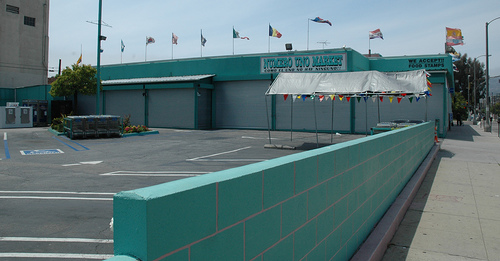
A double-coupon day for the feds
No, this isn’t another post about mayoral hormones. This week one of downtown’s big-time property owners and heavies was indicted on murder, bribery and extortion charges in a case that resurrects one of President Clinton’s most notorious pardons.
If you haven’t heard the classic American dream story of George Torres, the owner of Numero Uno markets, who turned a food cart on a corner south of downtown into a grocery empire and became one of south L.A.’s biggest landowners, you’ve probably heard of his former business partner, the well-connected Carlos “Horacio” Vignali.
In 2001, President Clinton bowed to appeals from the likes of Roger Mahony, Lee Baca, Gloria Molina, Richard Alatorre, Mike Hernandez, Xavier Becerra, Richard Polanco, Bob Hertzberg, former U.S. Attorney Alejandro Mayorkas – and then-Assembly Speaker Antonio Villaraigosa—and pardoned Vignali’s drug-dealing son, Carlos. The young man ended up serving six years of a 15-year term.
All of them soon had reason to regret getting involved in what became known as Pardongate and a federal investigation. And, now, they might be wondering what new disclosures are still to come in this six-year probe. The case should shed some needed light on L.A.’s underworld, a place too many people here seem to believe exists only in TV and the movies.
L.A. Weekly’s Jeff Anderson wrote a cover story on the allegations way back in 2005, and explored the relationship between father Vignali and Torres. Anderson also broke the story of Torres’ arrest on the Weekly’s website earlier this week, just ahead of this story and companion piece in the L.A. Times, which continues to follow the unfolding story.
Anderson, the resident expert, has provided the most complete context over the years:
THE TORRES-VIGNALI CONNECTION is explored in detail in a congressional report that resulted from Pardongate, when revelations surfaced that President Clinton granted clemency for Carlos Vignali Jr. — convicted of drug trafficking and sentenced to 15 years in federal prison in 1995 — along with other convicted criminals and one-time international fugitive Marc Rich. The granting of clemency occurred after payments were made to Clinton’s brother-in-law, Hugh Rodham, the brother of former first lady, New York state senator and 2008 Democratic presidential candidate Hillary Rodham Clinton…
The DEA documents, obtained by the L.A. Weekly, date back to 1976, when the elder Vignali allegedly negotiated with ATF agents to sell a machine gun and allegedly told them that he had smuggled heroin into the country using automobiles. In 1992, the younger Vignali is alleged to have driven vehicles connected to gangs engaged in drug smuggling. A 1993 DEA report states that the younger Vignali built hidden compartments into a truck for hauling cocaine, and that his father, known as “Pops,” was a supplier for his son. An additional 1993 report describes the Vignalis as heavy gamblers in Las Vegas, friends of the manager of Caesar’s Palace and associates of Numero Uno Markets owner George Torres. The report states that Torres, who like the elder Vignali has a rags-to-riches story and trades heavily in real estate, was worth between $200 million and $300 million.According to 1993 and 1997 DEA reports, Torres allegedly maintained a warehouse full of luxury vehicles, antique low riders and tractor-trailers used to move cocaine by concealing drugs inside laundry detergent and jalapeño-chile cans. He and Vignali were identified as immediate targets of a drug-trafficking investigation, the report states. The report further states that the DEA had been informed of allegations by investigators from L.A. IMPACT, a joint-powers criminal justice agency, and by the Santa Barbara Regional Narcotics Enforcement Team, that the Torres drug-trafficking outfit came into existence in the mid-1980s, distributing 1,800 kilos by the early 1990s.
A 1998 DEA report states that the elder Vignali was believed to be a financial partner in the Torres organization, allegedly setting up meetings between Torres and “individuals with extensive criminal backgrounds.” They were moving 100 kilos per month, the report states. In 1996, the report states, Torres’ grocery stores had sales of $50 million. Investigators believed he was laundering drug money through his stores and real estate transactions.Public records show Torres and Vignali engaged in numerous multimillion-dollar property transactions, either as partners or on opposite sides of a deal. While the elder Vignali was known as the well-heeled businessman who rubbed elbows with politicians, Torres was described in DEA reports as a tattooed heavy who flaunted Mafia connections and liked to intimidate his adversaries…
Notably missing from this week’s indictment is any charge dealing with drug smuggling. Torres’ lawyers dismissed the allegations two years ago, and again this week.
The DEA reports are untrue, Adelson, an attorney for Torres, told the Weekly in 2005. “They are based on layers of hearsay by persons with something to gain and whom the government has not identified,” he said, emphasizing that Torres no longer had business or personal relationships with the Vignalis. “That is an unfortunate association,” said Torres’ attorney, Brian Sun, on Wednesday.

Wow. Real intersting. Are you sure it’s not a made for TV script? It sure reads like one. “…[W]arehouse full of luxury vehicles, antique low riders and tractor-trailers used to move cocaine by concealing drugs inside laundry detergent and jalapeño-chile cans…” Criminy!
Alan, you’re supposed to write brightly colored words on the pictures that you post, like Celeste does. For instance, in the picture above, that would add so much meaning.
hmmmm…very interesting!
Thanks google
Hi all. Cool site Google
Thank.
Hi all. Cool site zawermash Google
Thank.